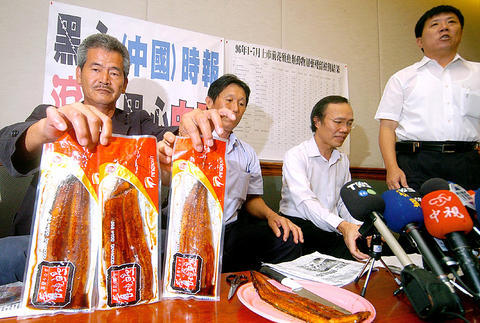Eel farmers yesterday demanded that the Chinese-language China Times retract a recent story with an inflammatory headline or face legal action.
Fisheries agency officials who participated in a discussion with eel farmers' groups yesterday confirmed that the groups said they would sue the daily for a story published on Tuesday with the headline: "Fisheries agency warns: eels are poisonous," if a written retraction is not issued within three days.
In addition, eel farmers plan to stage a protest that will surround the China Times' head office if the paper refuses to back down, said Shih Sheng-lung (石聖龍), an official at the agency.

PHOTO: CHIEN JUNG-FONG, TAIPEI TIMES
Test results released by the Fisheries Agency under the Council of Agriculture (COA) on Monday showed that eight aquaculture farms around the island were using banned additives, including seven eel farms. However, agency officials point out that only a tiny minority of aquaculture farms sampled tested positive for banned additives, with 99.88 percent of samples passing the test.
"We have had both more and less serious test results in the past that have been announced on our Web site," said Shih Sheng-lung, an official at the agency, "but it was not until the recent report of tainted aquaculture that the press started paying attention."
Shih said that the level of enrofloxacin found in the tainted eels, from 2.59 to 9.68 parts per billion, was not considered a serious health risk and could have resulted from environmental contamination rather than deliberate usage on the part of the farmers.
"The problem is the China Times improperly overemphasized the isolated cases of violation," said James Sha (沙志一), deputy director-general of the fisheries agency. "If this ends up hurting eel farmers, we will do what we can to aid them."
Meanwhile, Sha and Shih said that the COA had not agreed to demands made by eel farmers that the COA take out advertisements explaining the issue.

‘DENIAL DEFENSE’: The US would increase its military presence with uncrewed ships, and submarines, while boosting defense in the Indo-Pacific, a Pete Hegseth memo said The US is reorienting its military strategy to focus primarily on deterring a potential Chinese invasion of Taiwan, a memo signed by US Secretary of Defense Pete Hegseth showed. The memo also called on Taiwan to increase its defense spending. The document, known as the “Interim National Defense Strategic Guidance,” was distributed this month and detailed the national defense plans of US President Donald Trump’s administration, an article in the Washington Post said on Saturday. It outlines how the US can prepare for a potential war with China and defend itself from threats in the “near abroad,” including Greenland and the Panama

A wild live dugong was found in Taiwan for the first time in 88 years, after it was accidentally caught by a fisher’s net on Tuesday in Yilan County’s Fenniaolin (粉鳥林). This is the first sighting of the species in Taiwan since 1937, having already been considered “extinct” in the country and considered as “vulnerable” by the International Union for Conservation of Nature. A fisher surnamed Chen (陳) went to Fenniaolin to collect the fish in his netting, but instead caught a 3m long, 500kg dugong. The fisher released the animal back into the wild, not realizing it was an endangered species at

The Chinese Nationalist Party (KMT) is maintaining close ties with Beijing, the Democratic Progressive Party (DPP) said yesterday, hours after a new round of Chinese military drills in the Taiwan Strait began. Political parties in a democracy have a responsibility to be loyal to the nation and defend its sovereignty, DPP spokesman Justin Wu (吳崢) told a news conference in Taipei. His comments came hours after Beijing announced via Chinese state media that the Chinese People’s Liberation Army’s Eastern Theater Command was holding large-scale drills simulating a multi-pronged attack on Taiwan. Contrary to the KMT’s claims that it is staunchly anti-communist, KMT Deputy

The High Prosecutors’ Office yesterday withdrew an appeal against the acquittal of a former bank manager 22 years after his death, marking Taiwan’s first instance of prosecutors rendering posthumous justice to a wrongfully convicted defendant. Chu Ching-en (諸慶恩) — formerly a manager at the Taipei branch of BNP Paribas — was in 1999 accused by Weng Mao-chung (翁茂鍾), then-president of Chia Her Industrial Co, of forging a request for a fixed deposit of US$10 million by I-Hwa Industrial Co, a subsidiary of Chia Her, which was used as collateral. Chu was ruled not guilty in the first trial, but was found guilty